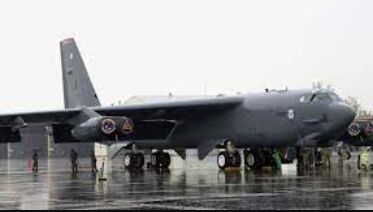South Korea, US, and Japan Unite in Historic Aerial Exercise to Combat North Korea's Growing Threat
South Korea, the United States, and Japan conducted their first joint aerial exercise, using a nuclear-capable B-52 bomber, to strengthen defense cooperation against North Korea's growing threats. The drill aimed to expand response capabilities and address regional stability concerns.
South Korea, the United States, and Japan joined forces in their first-ever joint aerial exercise on Sunday, aimed at strengthening their defense cooperation against the growing threats posed by North Korea's missile and nuclear capabilities. The exercise included the participation of a US nuclear-weapons-capable B-52 bomber, which landed at a South Korean airbase after a flyover at the country's largest defense exhibition.
B-52 bombers have the ability to fly over 8,800 miles without refueling, reaching an altitude of 50,000 feet. The aerial drill took place south of the Korean peninsula in an area where the air defense identification zones of South Korea and Japan overlap. This trilateral exercise marks a significant step towards expanding the response capabilities of the three countries against the escalating threats from North Korea. Pyongyang tends to view such exercises as preparations for an invasion, often responding with warnings of overwhelming action.
The arrival of the B-52 bomber follows the port visit of the nuclear-powered aircraft carrier USS Ronald Reagan, which drew anger from North Korea. In addition to the aerial exercise, South Korea and the US also completed a joint anti-submarine exercise called Silent Shark. These joint drills reflect the efforts of the US and its Asian allies to strengthen their ties amid tensions with North Korea and concerns over China's influence in the region. Leaders of Japan, South Korea, and the United States had previously agreed to conduct regular joint exercises and exchange real-time data on North Korea's activities during a summit held at Camp David in August.
Earlier this month, the three countries staged a joint maritime drill around the Korean peninsula for the first time in seven years, simulating the interception of North Korean smuggling vessels. Furthermore, Russia has shown interest in purchasing North Korean ammunition, while Pyongyang seeks Russia's help in developing its internationally condemned missile program. This mutual interest has led to the tightening of ties between the two neighboring countries, as Russian Foreign Minister Sergei Lavrov visited Pyongyang shortly after the joint aerial exercise.
As tensions on the Korean peninsula continue to rise, South Korea has been strengthening its security relationship with the US, its traditional ally, and entering into a trilateral defense arrangement that includes Japan. The collaboration between these three nations aims to address the increasing threat posed by North Korea's nuclear and missile capabilities and ensure regional stability.




